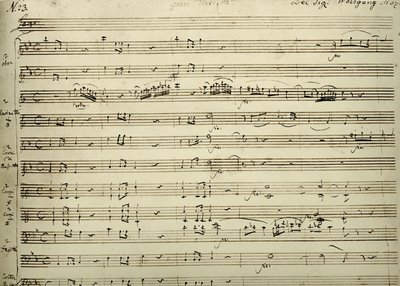Boulez Pairs Mozart with Berg
 Mozart, Gran Partita / Berg, Chamber Concerto, M. Uchida, C. Tetzlaff, Ensemble Intercontemporain, P. Boulez (released on November 11, 2008) Decca 478 0316 Online score: Mozart, Gran Partita, K. 361 |
 Mozart, Gran Partita, K. 361, holograph score, Library of Congress |
This sort of repertory is much more Ensemble Intercontemporain's specialty -- in fact, Boulez has previously recorded the work with this ensemble, just with Pinchas Zukerman instead of Christian Tetzlaff and Daniel Barenboim instead of Mitsuko Uchida. Truth be told, the combination featured on this disc is to be preferred, as the work is allowed more room to breathe (the timing is a couple minutes longer than the earlier version), especially in the moody Adagio movement, with the "midnight" section at the middle of the palindrome, with its twelve low C#s tolling in the murky distance. In fact, one listener who heard one of the concerts of this program at the Salle Pleyel last March (the work was recorded at IRCAM the following weekend) reports that many people in the audience arrived after intermission -- that is, intentionally skipping the Mozart to get to the Berg. Since the reverse has been known to happen at National Symphony Orchestra concerts, what does that say about the divide between traditionalist and contemporary listeners?
80'18"





















































8 comments:
Richter recorded the Berg with Kagan. Has anybody heard it?
According to the Monsaingeon book, he had a very low opinion of the earlier Boulez recording, which I believe he thought was under rehearsed.
According to Amazon, it's only available on a 4-CD box set that contains much that's available elsewhere.
Uchida is very good in this repertory.
Great comment. I added a link to the post to the re-release of the earlier Boulez/Ensemble Inter recording. In fact, Uchida makes a comment about the difficulty of the music and how this group had several full rehearsals and four performances to prepare the recording.
"Boulez, who does not normally go this far back into history."
Do your homework, Downey! If you look in the NYPhil archives, you will see that Boulez regularly programmmed Bach, Handel, Gluck, Haydn, lots of Mozart, Rameau, Schutz, and even Vorisek.
You know, if you are going to be that imperious as a commenter, anonymity seems extra cowardly. I have added what I assumed was clear in the review, that the comment you single out for attack was meant about Boulez's track record on disc. If you had thought about it a little before leaping down my throat, that might have occurred to you.
But, anyway, thanks for reading, I guess.
Not to pour water onto the mills of anonymous pomposity, but Boulez did record Handel with the NYPhil, Mozart Concertos with Curzon, and was once forced to have Schumann's Scenes From Goethe's Faust recorded.
I don't know about the Handel, but at least the other two performances were admittedly live recordings, which means that recording was rather more accidental than intentional on the part of Boulez.
And even some Bach -- as orchestrated by Webern, of course.
I recently purchased this recording and am enjoying it a lot; the Berg is a revelation to my ears. I am familiar with the older Barenboim/Zuckerman et al recording and used to listen to it with the score in-hand, and honestly it wound up being my least favorite Berg piece, but the present recording has turned me around and set me straight. In the older recording, the piano/violin cadenza used to seem cacophonous and wild, but the Tetzlaff-Uchida performance of it finds the "music" in it. They obviously got it right. I am now able to enjoy this piece fully instead of being puzzled by it.
@gymnopedies13 -- Thanks for sharing your thoughts. I am so glad that you enjoyed the recording as much as I did.
Post a Comment